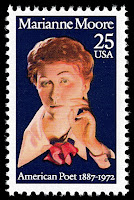Marianne Moor published the first version of 'Poetry' in 1919 and revised it many times for the next six decades. Employing the techniques of modernist poetry, Moore expands her idea of writing and reading poetry. In the poem, she differentiates genuine poetry from poetry produced by half poets and rejects existing ideas on poetic compositions and declares that genuine poetry can be produced on any mundane topics.
About the Author
Marianne Moore was born in 1887 in Kirkwood, Missouri, USA. Raised in the house of her Presbyterian grandfather, Moore published her early poems in popular literary journals like The Egoist, Poetry Magazine etc...She edited the American literary journal The Dial from 1925 to 1929. She brought out Collected Poetry in 1951 which won Pulitzer Prize and National Book Award.
Moore's poetry is known for linguistic precision, keen descriptions and acute observations of people, places, animals and art. She is a disciplined craftsman who advocates restraint, modesty and humour.
Outline of the Poem
The poem begins with the speaker joining a conversation on reading poetry. The poet shares the reader's dislike for poetry and feels that there are more important things to do than reading poems. It is clear that the speaker's dislike for poetry is only a lover's discord and when s/he starts reading, the contempt for reading gives way to genuine poetry. S/he then discovers in it genuine feelings and sensations and an appeal to the senses; thus poetry evokes sensual responses from readers such as making hands grasp, eyes dilate and hair rise. The poem becomes important because it is useful in getting touch with one's own feelings and not because it can be given high sounding interpretation by critics. When the poem becomes too derivative (not original) and it is not derived from personal experiences, it becomes unintelligible and reader can not appreciate it as the speaker says "we do not admire what we can not understand (line 9-11)".
In the following section, the speaker depicts the all encompassing nature of poetry and states that poetry can be made out of extremely ordinary experiences of the human and non human beings. Poetry can be produced out of the everyday activities of animals such as the bat in its upside down position, the pushing of elephants, rolling of wild horses, tireless wolf under a tree, quick movements of the skin of a critic engaged in study(hence immobile). The speaker continues to say that poetry can be made out of absolutely anything (living and non living objects) such as ball fan, the statistician, business documents and school books and there is no room for discrimination. The speaker warns that these things will not result in poetry if they are dragged (by force) into poetry by half poets.
In this section, the poet develops her concept of genuine poetry using oxymoronic and paradoxical phrases. She uses the phrase 'literalists of imagination' to refer to poets and the phrase is a combination of 'literal depiction' and imagination. This idea is made more explicit in the line "imaginary gardens with real toads in them" in which the poet asks to make a fine balance between the imaginative and real.
In the final section, the poet assures the readers that they are interested in poetry if they look for rawness of the raw materials of poetic composition i.e. genuine experiences, imagination and linguistic expression.
Analysis
In the poem 'Poetry', Marianne Moore addresses the common distaste for poetry and clearly defines her idea of reading and writing poetry. According to her, poetry can help readers to get in touch with their emotions and feelings. She lists instances of emotions evoked by poetry such as love, fear and wonder. She does not approve poetry that are not original and stresses that poetry should be original and useful.
As a celebrated American modernist poet, she does not romanticize poetry and states that anything (living and non-living) can be the subject matter of poetry. She then objectively lists diverse themes of poetry such as the rolling of wild horses to business documents and school books. She dispels all traditional concepts regarding the composition of poetry and finds poetry in the mundane and the trivial.
She warns poets not to drag the topics into prominence by giving them undue importance and special treatments. She stands for linguistic precision and acute observation. Moore practice of poetry involves imparting moral and intellectual insights from the close and accurate observation of objective details.
Moore uses modernist technical devices such as paradoxes to define her idea of good poetry. According to her, good poetry should combine the form and the substance, the real and the imaginative. Putting her own phrase in quotation, Moore states that poetry should create "imaginary gardens with real toads" in them. Quoting an oxymoronic expression from WB Yeats remark on William Blake, she defines a writer as a blend of literalism (portray something literally) and imagination.
A reader is interested in poetry if he s/he looks for fresh raw materials in poetry. By raw material, the poet means authentic feeling and imaginative expression combined with genuine experiences.


Thanks for sharing this beautiful idea with us. It will be very helpful for us. I am also sharing one of the best book-selling websites Kitablovers. It will help you to buy a book and we provide all types of books at a reasonable price and we have a variety of books. We have New books, second-hand books, and Old books in your budget. If you are a book lover then this is the best place for you.
ReplyDelete